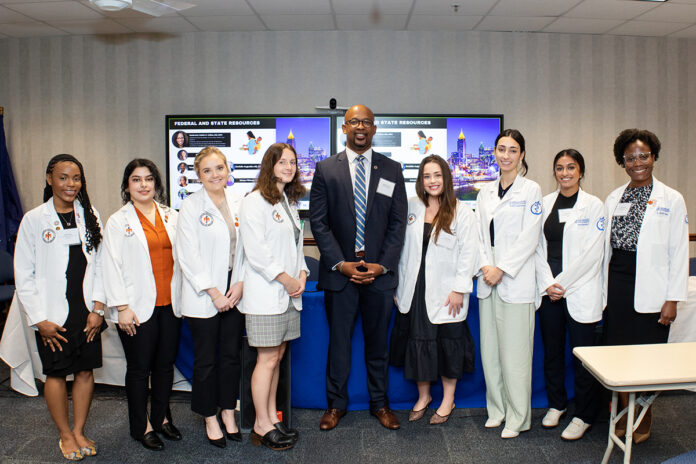
Editor’s Note: This story was written by Kedrick Williams, D.H.A., M.P.H., a senior rural health project manager for the Georgia Rural Health Innovation Center at Mercer University School of Medicine.
Georgia Rural Health Innovation Center Maternal Health Observership Program graduates presented their research projects at the Georgia Maternal Health Summit held on Sept. 24 at the Sam Nunn Atlanta Federal Center.
The summit was hosted by the U.S. Department of Health and Human Services, Centers for Medicare and Medicaid Services, the Office of the Assistant Secretary for Health and other agencies supporting maternal health care in Georgia. This was a kick-start event for regional maternal health activities focused on the eight Region IV states of Alabama, Florida, Georgia, Kentucky, Mississippi, North Carolina, South Carolina and Tennessee.
The event, themed “Making Connections: Overcoming Barriers to Maternal Health,” featured expert panels focused on connecting federal, state and local resources to physicians, health care professionals, and stakeholders to aid in addressing the barriers and challenges faced by women during and after pregnancy.
Antrell Tyson, regional director for Region IV, invited Maternal Health Observership Program graduates, who represented Mercer University School of Medicine and Morehouse School of Medicine, to the summit’s research exposition. The student-led research projects focused on addressing maternal health disparities and obtaining positive maternal health outcomes. This exposition and networking event provided insight into current research on maternal health in Georgia’s rural counties, highlighting systemic issues in maternity care in the state.
At Tyson’s request, students shared summaries of their maternal health research problems and recommended real-life, practical solutions to best address these disparities and meet the needs of rural Georgia families. The presentations also allowed the medical students to present their ongoing research projects to federal and state agencies, community organizations and practicing physicians.
Student research presentations included:
- Ashlee Dixon, Mercer: “Shortage of Perinatal Mental Health Access in Georgia”
- Abbie Earnest, Mercer: “Closure of Rural Hospitals and Obstetrical Units Who Serve Minority Populations”
- Fatima Humayun, Mercer: “Potential for Postpartum Medicaid Expansion Improving Health Equity and Maternal Mortality Ratios”
- Shea Kelley, Mercer: “Characterizing HPV Vaccination in Rural Georgia for Women Aged 18-21 Years”
- Megan Kral, Mercer: “Lack of Access to OB/GYN for Uninsured Patients”
- Anchal Kumar, Morehouse: “Addressing Maternal Health Disparities: A Comprehensive Approach to Preventing Postpartum Hemorrhage in Rural Georgia”
- Peyton Matt, Mercer: “Barriers to Breastfeeding Leading to Early Cessation: Risk Factors and Prevention Strategies”
- Anahit Mehranian, Morehouse: “The Effect of Pregnancy-Related Cardiovascular Complications & Obstetric Disparities on Maternal Mortality in Rural Georgia”
- Jaclyn Small, Morehouse: “Educating Rural Populations in Georgia on Prenatal Care: A Key to Healthier Outcomes Principles”
In addition to the summit’s mission to provide information and connect resources to partners, the event further served as a career pathway for rural medicine.
“Building a pathway involves four key elements: an apprentice, a mentor, an end goal, and a mechanism by which to get there,” said Kedrick Williams, D.H.A., M.P.H., senior rural health project manager and director of the Maternal Health Observership Program at Georgia Rural Health Innovation Center.
The observership program is the mechanism that enables rising second-year medical students to receive mentorship from OB-GYNs and maternal health care providers in rural communities. This intensive train-the-trainer approach helps students reach their end goal of becoming OB-GYN physicians to serve rural Georgia women and positively impact the disparities of rural maternal health care. Though this summer program spans only six weeks, it has a lasting effect beyond the program’s closing day as a result of students’ shadowing experiences, rural community engagement, and cutting-edge, solution-driven research projects.
The observership program led to an invaluable opportunity for students and staff to engage with federal agency representatives from Department of Health and Human Services, Centers for Medicare and Medicaid Services and the Office of the Assistant Secretary for Health, along with many other maternal health-focused organizations. The main mission of this event was to bring together providers, state and federal agencies, local community organizations, and maternal health advocates to discuss the maternal mortality crisis in the state of Georgia. This was accomplished through a full day of panel discussions, speaker seminars, and poster presentations by Mercer School of Medicine and Morehouse medical students.
Tyson and the Department of Health and Human Services expressed interest in creating future opportunities for students to share their maternal health research and solutions to address disparities affecting women and families in rural Georgia.









